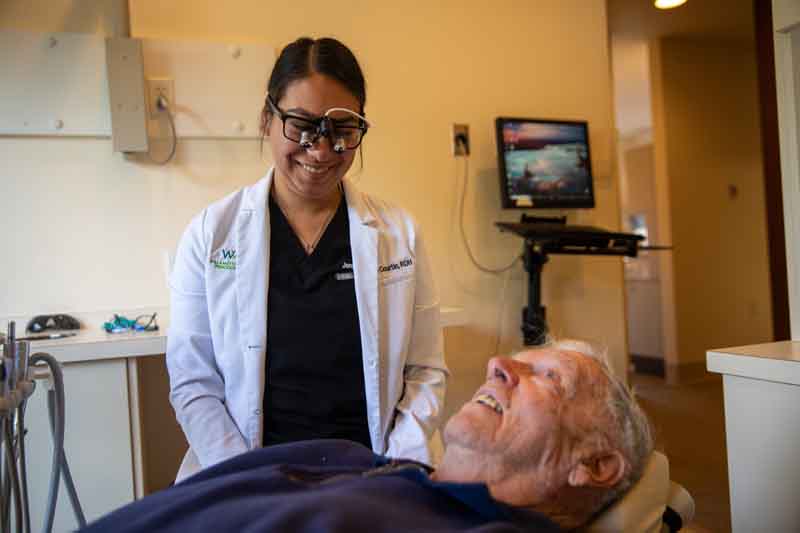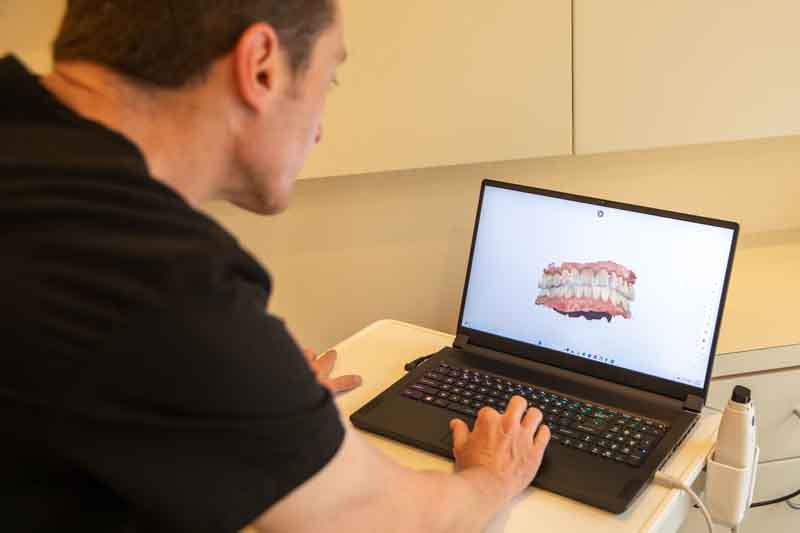At Willamette Valley Periodontics in McMinnville, your long-term gum health is our top priority. When periodontal disease (gum disease) takes hold, our skilled periodontist and his team offer a variety of top periodontal treatments to restore your gum health and revive your bright smile. At our practice in McMinnville, OR, periodontal treatment is not just about managing symptoms; it's about eliminating the infection and, where possible, regenerating the tissues lost to disease. Our top periodontal treatments encompass a range of therapies, from foundational cleanings to advanced regenerative procedures, all designed to halt disease progression, restore damaged structures, and preserve your natural teeth.
At our periodontal office in McMinnville, OR, our approach is always tailored to your specific needs, ensuring the most effective and comfortable path to a healthier smile.
What is Periodontal Regeneration?

We achieve periodontal regeneration using various sophisticated techniques, carefully chosen based on your individual needs. Our state-of-the-art treatment plans are designed to create an optimal environment for your body to heal and rebuild the very structures that support your teeth. Periodontal regeneration can help stabilize the teeth, improve their long-term health, reduce sensitivity, and enhance the overall health and appearance of your smile.
We offer the following periodontal services at Willamette Valley Periodontics in McMinnville:
Scaling and Root Planing (Periodontal Deep Cleanings)
At Willamette Valley Periodontics, when gum disease (periodontitis) has progressed beyond mild gingivitis, we often recommend a non-surgical procedure called scaling and root planing, commonly known as a "deep cleaning." This essential treatment is designed to meticulously remove harmful bacteria, plaque, and hardened calculus (tartar) that have accumulated both above and below your gum line. Scaling involves carefully removing these deposits from the tooth surfaces, and root planing smooths the root surfaces, making it easier for your gums to heal and reattach firmly to your teeth. Performed under local anesthesia to ensure your comfort, this procedure is crucial for halting the progression of gum disease, reducing inflammation and bleeding, and preventing further bone loss, ultimately helping to preserve your natural teeth and restore your periodontal health.
Arestin for Periodontitis
To provide comprehensive, effective treatment for gum disease, Willamette Valley Periodontics in McMinnville goes beyond traditional cleaning methods. In addition to thorough scaling and root planing, we often incorporate a powerful ally called Arestin® directly into the infected gum pockets. Arestin is a unique antibiotic in the form of tiny, undetectable microspheres that we place below the gum line right after a periodontal deep cleaning. These microspheres then slowly release a concentrated dose of the antibiotic minocycline over several days, targeting and killing the harmful bacteria that cause periodontitis right at the site of infection. This targeted approach is significantly more effective at fighting the infection than scaling and root planing alone, helping to reduce pocket depths and promote healthier gums.
By delivering the antibiotic directly where it's needed most, Arestin works continuously to suppress the bacteria long after you leave our office. This sustained release helps create an optimal environment for your gums to heal and reattach more firmly to your teeth, improving the overall success of your periodontal treatment. Using Arestin as part of your comprehensive care plan can lead to better outcomes, including reduced bleeding and swelling, and a greater chance of stabilizing your gum health. Our team will determine if Arestin is the right adjunctive therapy for your specific condition to help you achieve and maintain a healthier smile.
Gingivectomy
A procedure called a gingivectomy may be recommended to restore the health and appearance of the gums. This common periodontal procedure involves the precise removal of excess or overgrown gum tissue, often necessary when gum disease has caused the gums to swell and form deep pockets around the teeth. These pockets can harbor bacteria, making them difficult to clean effectively and leading to further infection and bone loss. By carefully trimming away this extra tissue, we can reduce pocket depth, eliminate areas where bacteria can thrive, and create a healthier gum contour that's easier for you to keep clean. A gingivectomy can also be performed for cosmetic reasons, to address a "gummy smile" where excess gum tissue makes teeth appear shorter than they are, revealing more of your natural tooth structure for a more balanced and aesthetically pleasing smile.
Chemotherapeutic Rinses

Chemotherapeutic rinses are specifically designed to target the microscopic organisms that cause inflammation and infection in your gums. Using chemotherapeutic rinses as directed by our team helps to control bacterial growth, reduce gingivitis, and create a healthier environment for your gums to heal and stay healthy between your professional cleanings.
Gum Grafting
To protect your teeth and improve the appearance of your smile, a procedure called a gum graft may be recommended. A gum graft procedure effectively targets gum recession, when the gum tissue pulls away from the tooth surface, exposing the roots. Exposed roots can lead to increased sensitivity to hot and cold, an unattractive "long tooth" appearance, and a higher risk of root decay and bone loss. A gum graft involves taking a small amount of healthy gum tissue from another area of your mouth (often the roof) or using donor tissue material and carefully attaching it to the area where the gum has receded. This effectively covers the exposed root surface, providing vital protection and improving the overall health and appearance of your gumline.
Oral Cancer Screening
At Willamette Valley Periodontics in McMinnville, your comprehensive oral health is our top priority, which is why we routinely include an oral cancer screening as part of your regular examination. This quick, painless, and vital screening involves a thorough visual and tactile examination of your entire oral cavity and surrounding areas. We carefully check your lips, tongue, cheeks, the roof and floor of your mouth, and your throat for any unusual lumps, bumps, red or white patches, sores that don't heal, or other abnormalities. We also gently feel your neck and jaw for any swelling or tenderness. Early detection is crucial for successfully treating oral cancer, as it can often be caught before it spreads. This simple screening dramatically increases the chances of a positive outcome, making it an essential component of your preventative care and overall well-being.
Esthetic Crown Lengthening
Do you feel that your teeth look too short, or that your smile shows too much gum tissue? If so, esthetic crown lengthening at Willamette Valley Periodontics might be the solution you've been looking for. This specialized periodontal procedure is designed to reshape your gum line, and sometimes the underlying bone, to expose more of your natural tooth structure. The result is a more balanced and harmonious smile, where your teeth appear to be their ideal length, and your gum line is sculpted to perfection. This procedure can dramatically improve the aesthetics of a "gummy smile," creating a more confident and pleasing appearance.
The esthetic crown lengthening procedure is performed under local anesthesia to ensure your complete comfort. Our periodontist will carefully remove excess gum tissue and, if necessary, a small amount of bone to reveal and restore the full beauty of your teeth. We'll provide you with detailed post-operative instructions to support optimal healing, helping you achieve the beautiful, balanced smile you desire with long-lasting results.
Bone Grafting

For any type of bone graft surgery, the goal is to provide the necessary support and encourage your body's natural healing processes to rebuild lost bone. At your consultation, Dr. Graser will work with you to determine the ideal bone grafting procedure for your specific needs.
Schedule Your Comprehensive Periodontal Treatment
Ready to discover how advanced, specialized periodontal treatments can transform your oral health and boost your confidence? Don't let gum disease hold your smile back any longer. We invite you to learn how our personalized approach can help you achieve lasting gum health, a bright smile, and a renewed sense of well-being. Contact Willamette Valley Periodontics in McMinnville today to schedule your consultation and take the crucial first step toward a healthier, more vibrant smile.
